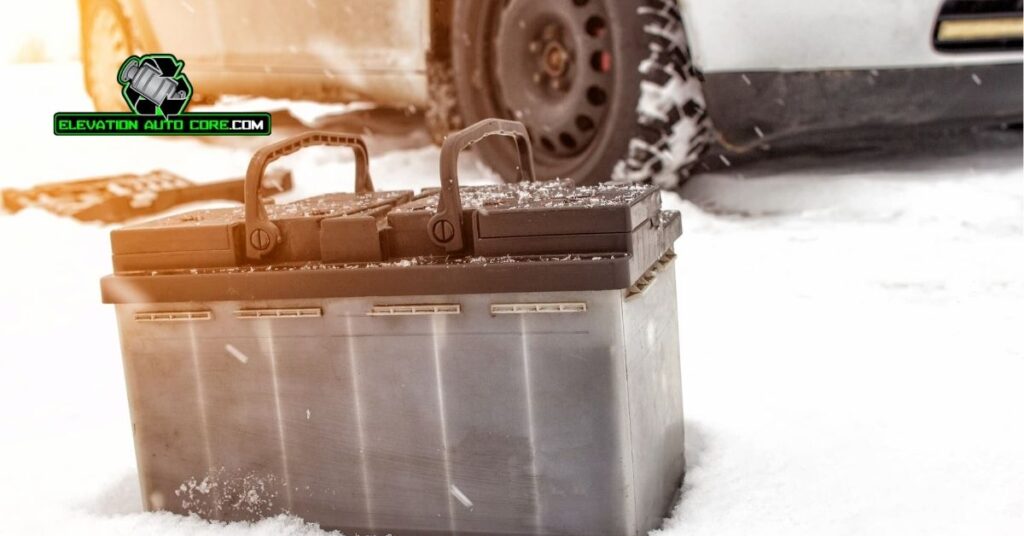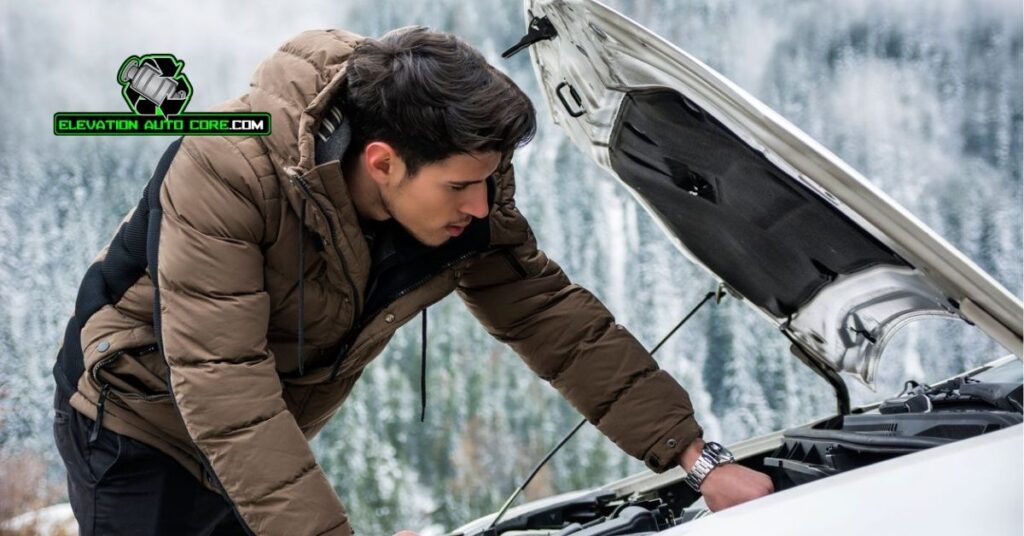If your car battery dies in the cold, will it recharge on its own? Winter weather can be brutal on batteries, leaving you stranded and wondering what to do next. Understanding how cold temperatures affect your battery and whether it can recover could save you time, money, and hassle. Keep reading to learn what happens to your battery in freezing conditions and how to handle it effectively.
Understanding Car Batteries And Cold Weather

Low temperatures significantly impact car batteries and their ability to function effectively. Knowing how the cold affects batteries can help you avoid issues and identify warning signs early.
Why Cold Weather Affects Car Batteries
Cold weather reduces a car battery’s chemical reaction speed, which lowers its energy output. Most lead-acid batteries work efficiently at around 80°F, but their performance drops as temperatures fall. At 32°F, a battery operates at approximately 65% capacity. By 0°F, it’s reduced to 40%.
Thickened engine oil during freezing conditions makes starting the engine harder, requiring more power from the battery. Cold temperatures also increase internal resistance, making it harder for batteries to charge or discharge energy. Fewer electrons transfer as a result, causing decreased efficiency.
Common Signs Of A Dead Car Battery In Cold
Slow engine cranking is one of the first signs of a dying battery. Dashboard warning lights often illuminate when charging issues occur. Clicking sounds when turning the key indicate insufficient power to start the engine.
Dim headlights can suggest a lack of sufficient charge. Electrical accessory failure, like malfunctions in power windows or radio, signals low voltage. If your car repeatedly struggles to start after extended exposure to cold, it’s likely time to inspect the battery.
Can A Dead Car Battery Recharge Itself In Cold?

A dead car battery in cold weather is unlikely to recharge itself. Low temperatures slow down the chemical reactions necessary for battery recovery, affecting its ability to regain power naturally.
Factors Influencing Recharge Potential
Ambient temperature plays a major role in determining if a battery can regain charge. At 32°F, a car battery operates at 65% capacity, and this capacity plummets to 40% at 0°F. Such limited functional capacity restricts any potential self-recharging.
Battery condition also significantly impacts recharge potential. Old or severely depleted batteries often fail to recover independently, as their internal components degrade in extreme cold. Even newer batteries struggle to generate sufficient chemical activity for automatic recharging when exposed to freezing temperatures.
Time spent in a discharged state further reduces the chance of recovery. Cold accelerates battery sulfation—a process forming lead sulfate crystals on battery plates—making it harder for the battery to hold a charge again.
Myths And Facts About Car Batteries In Winter
Some believe that a car battery can recharge itself if the vehicle is left in the cold for long enough. In reality, chemical reactions within the battery nearly halt when temperatures drop, making self-recharge virtually impossible.
It’s also a misconception that idling the car can quickly recharge a dead battery in freezing conditions. Batteries recover slower in the cold even when the engine is running, especially if they’ve experienced heavy discharge or prolonged exposure to low temperatures.
Cold weather doesn’t solely cause a dead battery but exacerbates pre-existing issues. Weak batteries often fail during winter because their capacity drops, not because cold creates new problems.
How To Recharge A Dead Car Battery In Cold Weather

Cold weather can reduce a car battery’s efficiency, but there are ways to recharge it safely and effectively. Using proper tools and precautions is essential to avoid damage or injury.
Using A Battery Charger
A battery charger provides the safest and most reliable recharge method. Select a charger compatible with your car battery’s type and voltage. Connect the charger’s clamps to the battery terminals—red to positive and black to negative. Only operate the charger after ensuring the connections are firm. Keep the charger in a dry area to avoid electrical hazards. Depending on the charger’s specifications, a complete charge can take 8-12 hours.
Jump Starting The Battery
Jump starting is a faster option if you have access to jumper cables and a working vehicle. Start by positioning the cars close enough for the jumper cables to reach without the vehicles touching. Attach the cables in the correct order: red clamp to the dead battery’s positive terminal, other red to the working car’s positive, black clamp to the working car’s negative, and final black to an unpainted metal surface on the dead car. After securing the connections, start the functioning vehicle and let it run for a few minutes before attempting to start the dead car. Remove the cables in reverse order once the dead car starts.
Tips For Safe Battery Handling
Always wear gloves and safety goggles when handling the battery. Avoid smoking, sparks, or open flames near the battery, as it may emit flammable gases. Inspect the battery for corrosion or damage before attempting any recharge method; important leaks or swelling indicate a replacement is needed. Never charge a frozen battery, as this could cause it to rupture. Ensure you work in a well-ventilated area to reduce the risk of gas buildup.
Preventing Car Battery Issues In Cold Weather

Cold weather can severely affect your car battery’s performance, but taking exact precautions helps mitigate potential problems. Following proper maintenance practices and using a battery designed for colder climates ensures optimal functionality.
Maintenance Tips For Winter
Check your car battery regularly to ensure it’s free of corrosion, which can hinder performance. Cleaning the terminals using a mixture of baking soda and water prevents buildup and ensures consistent connection.
Conduct battery tests to confirm it’s holding a charge effectively, especially when temperatures drop below freezing. Use a multimeter or visit a professional to assess the battery’s voltage and condition.
Park your vehicle in a garage or insulated area whenever possible to shield it from extreme cold. If indoor parking isn’t feasible, install a battery blanket or thermal wrap to maintain an adequate operating temperature.
Turn off all electrical accessories, like headlights and heaters, before starting the engine. This reduces strain on the battery by prioritizing energy for the ignition process.
Invest in a reliable battery maintainer to keep the charge level stable over time. Long periods of inactivity can decrease charge retention, even during moderate winter days.
Choosing The Right Battery For Cold Climates
Select a battery with a high cold cranking amps (CCA) rating to ensure sufficient starting power in freezing conditions. Batteries with at least 600 to 700 CCA are ideal for extremely low temperatures.
Opt for an AGM (Absorbent Glass Mat) or enhanced flooded battery for durability and efficient performance in colder weather. AGM batteries resist freezing better than standard flooded types due to their design.
Choose a battery compatible with your vehicle’s make and model to avoid inadequate performance or fitment issues. Refer to your car’s owner manual for recommended specifications.
Purchase from reputable brands known for reliability and cold-weather endurance. Trusted manufacturers test their products against harsh conditions, ensuring long-lasting performance.
Store your new battery before installation in a temperature-controlled environment to preserve its charge. Sudden exposure to freezing conditions diminishes efficiency during early use.
Conclusion
Cold weather can be tough on your car battery, but understanding how it reacts to freezing temperatures can help you stay prepared. A dead battery won’t recharge itself in the cold, so taking proactive steps like regular maintenance, proper storage, and using the right tools is essential. By following these tips and investing in a reliable battery suited for cold climates, you can avoid unexpected issues and ensure your vehicle stays ready to go, even in harsh winter conditions.

